|
|
| |
| Padma Perfumery Works Replenish your senses! |
| Rose Incense |
White Musk Incense |
Al Oudh Incense |
Sheik Al Arab Blue |
Jasmine Incense |
|
|
|
|
|
 |
 |
 |
 |
 |
|
|
|
Labdanum Incense and Oil
Here you can get comprehensive information on labdanum incense, labdanum resin, labdanum incense sticks, labdanum resin incense sticks, labdanum oil, labdanum essential oil, labdanum perfume and their uses. Labdanum incense and labdanum oil are made from a sticky dark brownish aromatic resin called labdanum which is procured from the Mediterranean shrubs of Cistus ladaniferus and Cistuscreticus, both of which belong to the rockrose family. The fragmant mass of the raw gum contains 20% or more of water and is plastic. Although these beautiful shrubs are indigenous to the temperate climate of Europe and the Mediterranean basin, they are also found to occur in some parts of North and South America. Labdanum is chiefly used for its aromatic properties in perfumes, cosmetics and in making incense. It is said to have an ambery odor with woody, earthy, smoky, and even marshy undertones. It also exhibits a leathery and honey like odor with hints of plum or oakmoss after a rain. Due to their very pleasant fragrance and other unique properties the labdanum incense are highly demanded and so are the labdanum oil and labdanum perfumes.
 The method employed to extract this aromatic labdanum resin in old days was very unusual and entertaining at the same time. Goats and sheep were driven into thick cistus forests to graze. As they browse through the forest the thick resin stick to their beards and body hair which was later combed out carefully. An alternate method employed the use of a wooden rake with strips of leather attached to it,called "lambadistrion", which was dragged across the bushes to collect the resin. The method employed to extract this aromatic labdanum resin in old days was very unusual and entertaining at the same time. Goats and sheep were driven into thick cistus forests to graze. As they browse through the forest the thick resin stick to their beards and body hair which was later combed out carefully. An alternate method employed the use of a wooden rake with strips of leather attached to it,called "lambadistrion", which was dragged across the bushes to collect the resin.
In ancient Egypt, most of the false beards that the Pharaohs wore were made of goat hair stuck together by labdanum. It was also used it in their Kyphi mixtures. The Japanese used it to make Neriko mixtures for tea ceremonies.
- Chemical Constituents
- Camphene
- Sabinene
- Myrcene
- Phellandrene
- Limonene
- Cymene
- Cineol
- Borneol
- Nerol
- Geraniol
- Fenchone
Uses
 In modern age, labdanum is chiefly used to make perfumes and incense sticks. It is quite popular in the commercial market as it is similar in appearance to ambergris, which was banned in many countries after whales were declared as an endangered species. The raw gum is obtained by boiling the twigs and leaves of the plant. The gum is further steam distilled to produce the essential labdanum oil, called istus ladanifer, which can be used to treat catarrh, diarrhea, dysentery and even to stimulate menstruation. The oil is also a stimulant, antiseptic, astringent, expectorant and possesses anti-biotic properties. Industrially, labdanum oil is used as a fixative and fragrance in the production of soaps, detergents, oils, cosmetics and perfumes. It is also used as a food additive in soft drinks, meat, non alcoholic beverages, baked products and confectionery. In modern age, labdanum is chiefly used to make perfumes and incense sticks. It is quite popular in the commercial market as it is similar in appearance to ambergris, which was banned in many countries after whales were declared as an endangered species. The raw gum is obtained by boiling the twigs and leaves of the plant. The gum is further steam distilled to produce the essential labdanum oil, called istus ladanifer, which can be used to treat catarrh, diarrhea, dysentery and even to stimulate menstruation. The oil is also a stimulant, antiseptic, astringent, expectorant and possesses anti-biotic properties. Industrially, labdanum oil is used as a fixative and fragrance in the production of soaps, detergents, oils, cosmetics and perfumes. It is also used as a food additive in soft drinks, meat, non alcoholic beverages, baked products and confectionery.
Mixes Well With
Amber, bay laurel, calamus, cardamom, chamomile, copal-black, iris root, lavender, musk seed, nutmeg, oakmoss, opoponax, patchouli, rosemary, rose, saffron, sandalwood, spikenard, storax, tolu balsam and turmeric.
Contact us to buy or for more information on labdanum incense, labdanum resin, labdanum incense sticks, labdanum resin incense sticks, labdanum oil, labdanum essential oil, labdanum perfume.
|
|
|


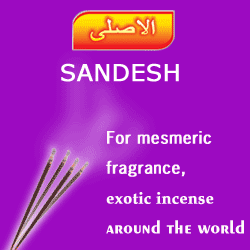

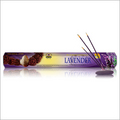
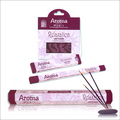
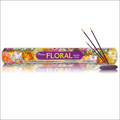
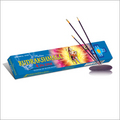
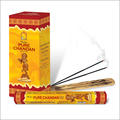
 The method employed to extract this aromatic labdanum resin in old days was very unusual and entertaining at the same time. Goats and sheep were driven into thick cistus forests to graze. As they browse through the forest the thick resin stick to their beards and body hair which was later combed out carefully. An alternate method employed the use of a wooden rake with strips of leather attached to it,called "lambadistrion", which was dragged across the bushes to collect the resin.
The method employed to extract this aromatic labdanum resin in old days was very unusual and entertaining at the same time. Goats and sheep were driven into thick cistus forests to graze. As they browse through the forest the thick resin stick to their beards and body hair which was later combed out carefully. An alternate method employed the use of a wooden rake with strips of leather attached to it,called "lambadistrion", which was dragged across the bushes to collect the resin.  In modern age, labdanum is chiefly used to make perfumes and incense sticks. It is quite popular in the commercial market as it is similar in appearance to ambergris, which was banned in many countries after whales were declared as an endangered species. The raw gum is obtained by boiling the twigs and leaves of the plant. The gum is further steam distilled to produce the essential labdanum oil, called istus ladanifer, which can be used to treat catarrh, diarrhea, dysentery and even to stimulate menstruation. The oil is also a stimulant, antiseptic, astringent, expectorant and possesses anti-biotic properties. Industrially, labdanum oil is used as a fixative and fragrance in the production of soaps, detergents, oils, cosmetics and perfumes. It is also used as a food additive in soft drinks, meat, non alcoholic beverages, baked products and confectionery.
In modern age, labdanum is chiefly used to make perfumes and incense sticks. It is quite popular in the commercial market as it is similar in appearance to ambergris, which was banned in many countries after whales were declared as an endangered species. The raw gum is obtained by boiling the twigs and leaves of the plant. The gum is further steam distilled to produce the essential labdanum oil, called istus ladanifer, which can be used to treat catarrh, diarrhea, dysentery and even to stimulate menstruation. The oil is also a stimulant, antiseptic, astringent, expectorant and possesses anti-biotic properties. Industrially, labdanum oil is used as a fixative and fragrance in the production of soaps, detergents, oils, cosmetics and perfumes. It is also used as a food additive in soft drinks, meat, non alcoholic beverages, baked products and confectionery. 